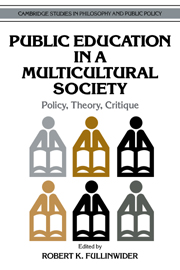Book contents
4 - Culture, subculture, multiculturalism: educational options
Published online by Cambridge University Press: 05 June 2012
Summary
It is a truism that in the United States of America “we live in a multicultural society.” But the obviousness and apparent clarity of this truism, like the apparent clarity and obviousness of most such truisms, dissolves upon inspection. To begin with what is, perhaps, the least patent difficulty, what people normally have in mind when they pronounce this slogan, is that the United States is a multicultural nation. This is by no means obviously the same thought, since that we in America constitute a nation is, so to speak, a juridical and constitutional fact, while our being a society requires, I should have thought, both more and less than this.
The people of Martinique, after all, are French nationals: but there is surely such a thing as Martinican society as distinct from French society – the society of the “hexagon” – and it is not obvious that Martinicans generally are participants in the latter. Similarly, many Native Americans, who live on reservations, while clearly American nationals, might be thought to live in a separate society from the rest of us; and we might also argue, less uncontroversially, that soldiers on bases, the inhabitants of Bel Air, or of South Central L.A., or of San Francisco's Chinatown, live in societies separate from those of the people whose lives go on around them.
- Type
- Chapter
- Information
- Public Education in a Multicultural SocietyPolicy, Theory, Critique, pp. 65 - 89Publisher: Cambridge University PressPrint publication year: 1996
- 3
- Cited by



